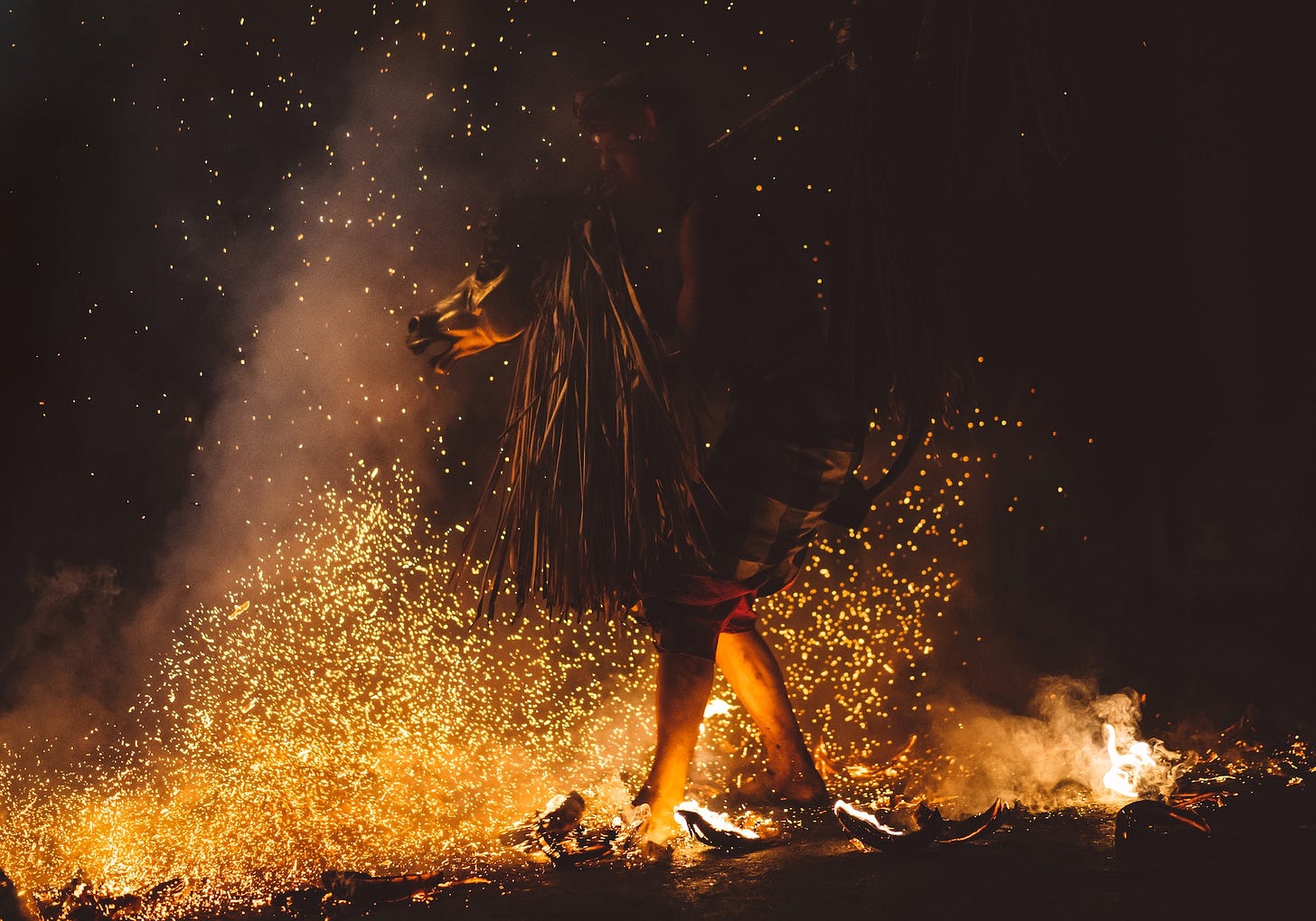I remember someone — my sister, I think — telling me once that the famous writer Salman Rushdie used to work in advertising four or five days a week and then, at the end of his working week, take a long bath to wash away that part of his life before starting on his other, “real” writing (his creative writing).
I love this kind of ritual. I’ve been thinking a lot lately about how rituals have taken on special importance over the last 18 months (going to the cafe to get your morning coffee has a whole new meaning), and how we’ve created new ones (like how a friend and I starting meeting on the clifftops last winter to eat nachos, or in the sand dunes to plunge into the rock pools and drink a cup of cacao, or like how thousands of people all along Port Phillip Bay now run into the water each morning).
Often, rituals mark transitions from one thing to another. Turning the lamps on at 5pm. Having a shower at the end of the work day. Takeaway on Friday nights. Pouring a glass of wine. Lighting a candle when engaging in creative work. Changing into certain clothes for certain activities. Spring cleaning. Setting intentions at the time of the new moon. Rituals acknowledge the cyclic, rhythmic nature of life and the world.
And when we’re having an experience of sameness (ie. right now), rituals help differentiate. They punctuate our days. They take the blob of time and repetition that has become our lives and sculpt it, partly, into something else. Rituals display a kind of reverence and recognition that life differs from moment to moment, and that we’re here for it. When the world feels simultaneously unpredictable and mundane, rituals provide both consistency and a little bit of magic. They lift us up from monotony, enhance our lives and infuse them with joy, meaning and a sense of the sacred.
I’ve also been thinking about the difference between habits, rituals and routines. I think the main difference between rituals and habits is that habits are usually unconscious and unthinking, while rituals are conscious and intentional. When we say we do something “out of habit”, we mean that we do it without thinking about it. This doesn’t mean that all habits are bad or unhelpful: sitting down to meditate each morning can become a habit, or grabbing your runners and heading out for a walk. But rituals, by definition, must be performed with presence and awareness. Where habits often involve operating on autopilot and disengaging from the world, rituals invite us to re-engage.
Routines are something I automatically recoil from (hence why I've rarely had a normal job), but I do keep hearing that having a routine is helpful during lockdown. This is how the great Esther Perel explains the difference between routines and rituals: "Routines are concrete repetitive actions that help us develop skills while creating continuity and order. Rituals are routines elevated by creativity, driven by intention, and imbued with meaning.”
The cool thing is that you can turn (or "elevate", as Esther says) habits or routines into rituals. After successfully breaking my social media habit last month, I've gotten into a bad habit of doom-scrolling. I've decided to turn this habit into a ritual by switching my phone off aeroplane mode mid-morning, sitting down with a hot drink and limiting myself to just 20 minutes reading the news. A friend of mine and her partner put their small kids to bed and then pour a glass of whisky to drink while they clean the house after dinner. This is a routine transformed into a ritual.
Crafting rituals
Reflect on the rituals you already engage in: daily; weekly; monthly; seasonally; culturally; in your family; or each time you see a particular person. Where do these rituals come from? How do they make you feel? What do they provide?
Reflect on your existing habits and routines. Can these be elevated or transformed into rituals?
Is there a ritual you'd like to incorporate into your morning or evening routine to welcome or farewell the day? I've just (as in, two days ago) begun a new ritual where I go out into the garden in the morning and listen to the birds, notice the smells and feel the fresh air on my skin as I pick mint leaves. I do my breathing exercises while my tea cools and then I drink my mint tea while looking out the kitchen window. It means that I start my day attending to nature before anything else. Or, you could design a night time ritual of turning your phone onto aeroplane mode, lighting a candle and listening to a playlist (I like this Nature Sounds one) for the half hour before bed.
In a world with increasingly overwhelming news, may we all experience the refuge and enlivening nature of ritual.
As I finish writing this, someone coincidentally just sent me a Ted Talk from Esther Perel on the routines, rituals and boundaries we need right now. Aaaaand here is a podcast interview with her on the same topic. Enjoy!
Much love,
Jane


